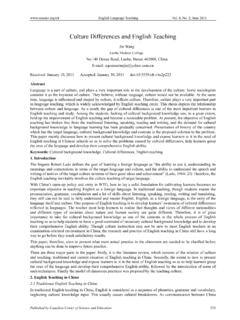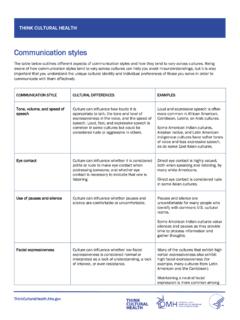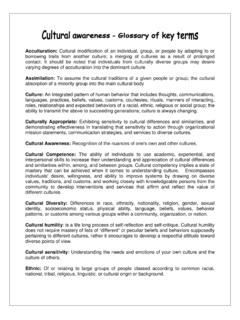Transcription of ARE CULTURAL DIFFERENCES IN EMOTION REGULATION …
1 421 ARE CULTURAL DIFFERENCES IN EMOTION REGULATIONMEDIATED BY PERSONALITY TRAITS?DAVID MATSUMOTOSan Francisco State UniversityThis article reports a study that documents United States Japan DIFFERENCES in EMOTION REGULATION anddemonstrates that those DIFFERENCES are entirely accounted for by individual DIFFERENCES in findings raise questions about studies that merely document cross-national DIFFERENCES in a psy-chological variable yet attribute the source of the observed DIFFERENCES to CULTURAL variables without empir-ical justification to do so. Such DIFFERENCES may be accounted for by aggregate DIFFERENCES in :culture; personality; EMOTION ; EMOTION REGULATION ; mediation; unpackagingEmotion REGULATION is an important conceptin personality and social psychology(Feldman Barrett, Gross, Christensen, & Benvenuto, 2001; Gross, 2002; Gross & John,2003). Individual DIFFERENCES in it have been related to inauthenticity, interpersonal function-ing, and well-being (Gross & John, 2003), intimacy in close relationships (Field, 1994;Gottman, 1994), and public behavior in contexts as wide ranging as athletics (Hanin, 2000)and the workplace (Fisher & Ashkanasy, 2000; Grandey, 2000).
2 It contributes to positiveintracultural and intercultural adjustment; immigrants and sojourners with better emotionregulation have less depression, anxiety, culture shock, and homesickness, and report higherlevels of happiness, well-being, marital satisfaction, language proficiency, and income(Matsumoto, LeRoux, Bernhard, & Gray, 2004; Matsumoto et al., 2003; Matsumoto et al.,2001). And these outcomes can be predicted months after assessment (Matsumoto et al.,2003; Yoo, Matsumoto, & LeRoux, in press).There are two ways of conceptualizing EMOTION REGULATION (Bridges, Denham, &Ganiban, 2004; Cole, Martin, & Dennis, 2004; Eisenberg & Spinrad, 2004). One way viewsemotions as regulators of intrapersonal and interpersonal processes, referring to the role thatemotions play in everyday life and the changes that occur when an EMOTION is activated ( , EMOTION regulating something else).
3 A second way views emotions as they themselves areregulated ( , changes in activated or aroused EMOTION or EMOTION as being regulated; Coleet al., 2004). The work reported here is based in the latter conceptualization. I define emo-tion regulationas the ability to manage and modify one s emotional reactions to achievegoal-directed purpose of this article is to document the existence of country DIFFERENCES on emo-tion REGULATION and demonstrate that those DIFFERENCES are mediated by individual differ-ences in personality traits. Below, I present a conceptualization of EMOTION REGULATION andAUTHOR S NOTE: I thank Seung Hee Yoo for her comments on a previous draft of this article; and Sanae Nakagawa, AndresOlide, Devon McCabe, Marija Drezgic, and Akiko Terao for their assistance in the general laboratory program. Correspondenceconcerning this article can be sent to David Matsumoto, Department of Psychology, San Francisco State University, 1600 Holloway Avenue, San Francisco, CA, 94132; e-mail OF CROSS- CULTURAL PSYCHOLOGY, Vol.
4 37 No. 4, July 2006 421-437 DOI: 2006 Sage Publicationshow CULTURAL DIFFERENCES should be manifested in it. I then discuss the need for unpackag-ing those CULTURAL DIFFERENCES , which I do with THEORETICAL BASIS FOR UNDERSTANDING EMOTIONREGULATION AND CULTURAL DIFFERENCES IN ITUnderstanding EMOTION REGULATION begins with a model of EMOTION arousal. Althoughmany theories exist, by and large, they suggest that a stimulus is first appraised and thatthis appraisal then leads to an EMOTION (Ellsworth & Scherer, 2003). The aroused emotionthen activates thinking, feeling states, expressive behaviors, and on this general model, Gross (2001) identified five points in time in which emo-tions could be regulated: (1) situation selection, (2) situation modification, (3) attentionaldeployment, (4) cognitive change, and (5) modulation of experiential, behavioral, or physio-logical responses. He characterized the first four processes as antecedent focused, and thefifth process as response (2001) and Gross and John (2003) focused on twoof these: cognitive change and modulation of response.
5 He called the former cognitive reap-praisal, defining it as the way in which individuals reconstrue an EMOTION -eliciting situationto change its emotional impact. He also focused on expressive suppression, which referredto the inhibition of ongoing emotional expressive DIFFERENCES may exist in these EMOTION REGULATION processes. For instance, cul-ture should affect antecedent-focused strategies (such as reappraisal), because cultures dif-fer in their worldviews, ideologies, values, and concepts of the self (Markus & Kitayama,1991, 1998; Matsumoto, 2005; Schwartz, in press; Schwartz & Bardi, 2001). Culturalworldviews are social constructions of reality that presumably characterize importantaspects of one s culture ( , American culture is individualistic; East Asian cultures arecollectivistic and group oriented; Mexican culture is family oriented, etc.). Because culturalworldviews can differ across cultures, they can help to construct different self-concepts inpeople of different cultures.
6 Like the concept of the self (Markus, 1977), which is also asocial construction, CULTURAL worldviews are ideological belief systems that individuals useas guidelines to explain their and others behaviors. When reappraising events, therefore, itis likely that individuals will tap into these CULTURAL and personal ideologies to retrieveguidelines for ways in which they should evaluate or appraise EMOTION -eliciting should also affect the modulation of emotional responses (such as suppres-sion) because of the role that EMOTION and its communication plays in social life. Theexpression of anger, for example, may be threatening to interpersonal relationships,whereas expressions of joy may bring people together. Expressions of disgust may beappropriate among one s work colleagues in one culture but not in another. These differ-ences exist because the meanings of social relationships differ from one culture to the next,and these DIFFERENCES produce different guidelines for the REGULATION of expressive behav-ior.
7 Collectivistic cultures (Hofstede, 2001), for instance, focus on the primacy of one sin-group goals over individual wishes and desires, requiring individuals to adjust theirbehavior to the group more than individualistic cultures. Collectivistic cultures, therefore,emphasize values such as conformity, obedience, and in-group harmony, at least as ide-ologies. These, in turn, produce guidelines for individuals in more collectivistic cultures todownplay emotional expressions that threaten in-group harmony and to encourage theexpression of emotions that maintain or create also differ in how they deal with status relationships. All societies must createhierarchies, which are necessary for organized group functioning, and ultimately, OF CROSS- CULTURAL PSYCHOLOGYSome cultures emphasize the status and power differentials that exist within hierarchies,whereas other cultures minimize them (Hofstede, 2001).
8 On one hand, one would expectthat cultures that emphasize status and power DIFFERENCES will encourage the expression ofemotions that maintain status and power DIFFERENCES and downplay emotional expressionsthat threaten this differential. On the other hand, cultures that minimize status and powerdifferences within hierarchies should be more willing to allow for the expression of emo-tions that threaten the RESEARCH DOCUMENTING CULTURALDIFFERENCES IN EMOTION REGULATIONT here are several bodies of evidence that indirectly point to the existence of culturaldifferences in EMOTION REGULATION . For example, cultures differ in appraisals that lead to EMOTION (Matsumoto, Kudoh, Scherer, & Wallbott, 1988; Mauro, Sato, & Tucker, 1992; Roseman,Dhawan, Rettek, & Naidu, 1995; Scherer, 1997a, 1997b), and these might correspond withsituation selection. Cultures differ in emotional expression (Ekman, 1972; Friesen, 1972;Matsumoto & Kupperbusch, 2001) and in the rules governing their modification called displayrules (Biehl, Matsumoto, & Kasri, in press; Matsumoto, 1990, 1993; Matsumoto, Takeuchi,Andayani, Kouznetsova, & Krupp, 1998; Matsumoto et al.)
9 , 2005b; Matsumoto, Yoo,Hirayama, & Petrova, 2005c). And cultures differ in coping, a process related to cognitivereappraisal (Bjorck, Cuthbertson, Thurman, & Lee, 2001; Cole, Bruschi, & Tamang, 2002;Hwang, Scherer, Wu, Hwang, & Li, 2002; Morling, Kitayama, & Miyamoto, 2003; Taylor,Sherman, Kim, Jarcho, & Takagi, 2004; Tweed, White, & Lehman, 2004; VanderVoort, 2001;Yeh & Inose, 2002).Country DIFFERENCES on the CULTURAL dimension Hofstede (1980, 2001) calls uncertaintyavoidance also provide indirect support for CULTURAL DIFFERENCES on EMOTION defines uncertainty avoidance as the degree to which people feel threatened bythe unknown or ambiguous situations and have developed beliefs, institutions, or rituals toavoid them. Cultures high on uncertainty avoidance may be associated with low mean lev-els of EMOTION REGULATION , whereas cultures low on uncertainty avoidance may have highlevels of EMOTION REGULATION .
10 Individuals high on EMOTION REGULATION would tend to feelless threatened by unknown or ambiguous situations and would be able to deal with suchsituations more constructively than those with low EMOTION DIFFERENCES on the personality dimension of neuroticism also provide indirectsupport for CULTURAL DIFFERENCES on EMOTION REGULATION (Allik & McCrae, 2004; McCrae,2002; McCrae, Costa, del Pilar, Rolland, & Parker, 1998; McCrae et al., 2005). Neuroticismis typically defined as emotional lability, and high scores on it probably reflect low scoreson EMOTION REGULATION and vice versa. Moreover, Hofstede s uncertainty avoidance andMcCrae s neuroticism are related to each other on the country level, suggesting that thesedimensions share a common denominator. One may be EMOTION DIFFERENCES on extraversion also provide indirect support for CULTURAL differenceson EMOTION REGULATION . It has been correlated with both the experience and expression of pos-itive emotions (reviewed below) and thus should be negatively correlated with evidence for the existence of CULTURAL DIFFERENCES in EMOTION REGULATION comes froma recent study by Matsumoto and colleagues (2005a), who asked 3,258 respondents in22 countries to complete Gross s (Gross & John, 2003) EMOTION REGULATION Questionnaire(ERQ).











